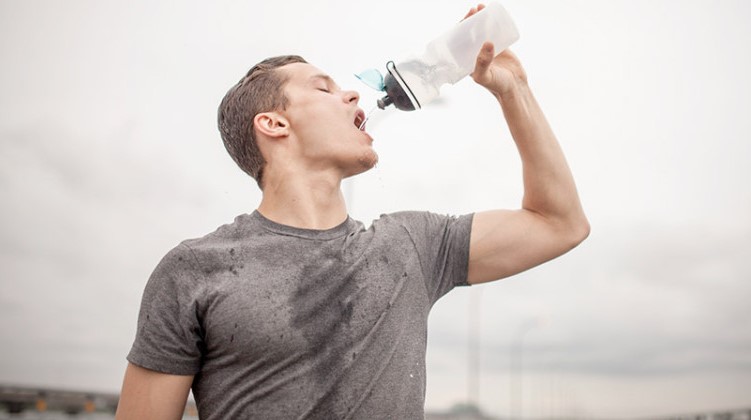Most people understand the need to stay hydrated to maintain their level of activity throughout the day. But not everyone understands how to stay hydrated, especially if you regularly engage in high-intensity workouts. It is easy to dismiss the role that water plays in optimizing your fitness and bodybuilding goals. But according to the American Council on Exercise, you should drink water before, during, and after a workout session. This post reveals the best time to hydrate and the quantity of water you should drink. We also highlight some other hydrating drinks that you should consider drinking before your workout today.
The impact of dehydration on the body
Symptoms of mild dehydration include headaches, excessive sweating, and general aches and pains, so you might assume that only severe dehydration would have a negative effect on exercise.
Did you know that even a 2% drop in fluids can cause a performance drop of between 10 and 20%? So, even if you don’t feel thirsty, your performance may be suffering from a lack of water.
Thirst and a dark urine color are both symptoms of dehydration. Because a dehydrated brain mistakes hunger for thirst, it can also lead to gastrointestinal problems, including constipation and an increase in appetite. The body requires water when these signs are present.

What is the recommended daily amount of water?
Numerous factors, including your daily activity level, determine how much water you need to drink. The weather at the time of your workout will also influence the volume of water you need to drink before, during, and after a workout. You’ll naturally perspire more in warmer weather, so the amount of water you’d need to drink would be higher compared to much cooler weather.
However, in order to be healthy, it is recommended that you consume at least 2 liters of water daily. If you tend to sweat excessively while exercising, you may want to increase this amount even more than the recommended 500 ml per hour of rigorous training.
Drink water after every 15 minutes.
Quite a few individuals get caught here. Most people know to bring water to the gym for a mid-workout drink, but it’s even more crucial to make sure you’ve refilled your hydration stores before hitting the weights or working your cardio on the treadmill.
You need water the most first thing in the morning because you’re already dehydrated from sleeping. To have the energy to exercise when you’re ready to do so, drinking fluids frequently throughout the day is essential.
It can be challenging to take in enough fluids when you’re in the zone, but staying hydrated is crucial.
Water breaks between sets or during cardio intervals help prevent the dehydration that might hinder performance.
You can easily make sure you drink enough water by setting a timer (on your phone or watch) to go off every 15 minutes, prompting you to drink 7 to 10 ounces of water. This is of utmost significance if you plan on exercising for an extended period of time.
Keep in mind that you can drink 8 ounces of water between 20 and 30 minutes before your workout or at any time during your warm-up.
Drink water two hours before the workout.
It is recommended that you drink 17 to 20 ounces of water two hours prior to any exercise. Water helps keep your body at a consistent temperature and also acts as a natural lubricant for your joints. It aids in the movement of nutrients, which provides you with the energy needed to successfully execute your workout sessions while also helping to maintain your general health. Poor water intake impairs physical performance. Fatigue, muscle cramps, dizziness, and even more severe symptoms could arise from dehydration.

Drink water post-workout.
Following an intense workout session, you should attempt to replenish lost fluids by drinking 1.5 times as much water as you lost. Avoid completing this in one sitting, though. Space it out throughout the following two to six hours.
Because fluid loss occurs both during exercise and afterward in the form of sweat and urination, you should replenish those losses by drinking more water than you consume throughout your workout. In the 30 minutes following your workout, aim to consume 8 ounces of water.
Don’t Just Stick to Water
If you have engaged in strenuous workouts lasting longer than three hours, then water is not the only drink you should consume. Although water is the most important hydrating beverage, it is not the only one. Here are some additional beverage options that will help you stay hydrated and replenish any nutrients you may have lost.
Chocolate Milk
Chocolate milk contains calcium and salt, which help replenish what you lose through perspiration. The carbohydrate content of chocolate milk will provide you with energy fuel, while its protein will aid in your recovery after a workout.
Drinks with electrolytes
Sodium, chloride, potassium, magnesium, and calcium are all examples of electrolytes that are essential to bodily function. However, an electrolyte imbalance can leave you feeling rundown and dehydrated after an intense workout due to the perspiration that accompanies it. What’s the fix? An electrolyte-rich fluid can help you feel normal again. Sports drinks can help you rehydrate, but it is advisable to stick with a low-sugar variety for optimal results.
Hydration with Coconut Water
Coconut water is a good choice for rehydrating after a strenuous workout because it contains electrolytes like potassium, salt, and magnesium that your body has lost via sweat. Also, the natural sugars in coconut water are great for recharging your batteries after a high-intensity workout.
Tea without sugar or caffeine
Instead of drinking plain water or adrenaline-pumping sports drinks after your workout, try a calming cup of hydration tea instead. The antioxidant-packed tea can aid in hydration, muscular repair, and improving your general well-being. Fruit-flavored, chamomile, ginger, mint, and caffeine-free green teas are ideal post-workout drinks, but you should only consume a decaf variety. After an exhausting workout, the last thing you need is caffeine’s potential to make you even more dehydrated.

The Juice of Vegetables
Vegetable juice is a very useful post-workout recovery drink because vegetables are an excellent source of critical nutrients. The vitamins, minerals (including electrolytes), and antioxidants found in vegetable juices like spinach, beet, and carrot drinks are ideal for assisting in muscle healing and rehydration after an exercise.
Smoothies
You can hydrate with a smoothie by mixing your preferred fruits and veggies with your preferred liquid and protein source (such as coconut water, almond milk, Greek yogurt, or protein powder). If you’re the type to lose your appetite after a workout, then plant-based smoothies are a great option because they’ll refill your body’s energy levels without requiring you to cook a whole meal.
Final Thoughts
In spite of exercise’s many advantages, dehydration is an inevitable byproduct. Staying hydrated is always important, but it’s more crucial when working out.
The key to avoiding dehydration is replacing lost fluids in a timely manner. The highest possible workout performance can be attained by following advice about how much, when, and what kinds of fluids to consume.


